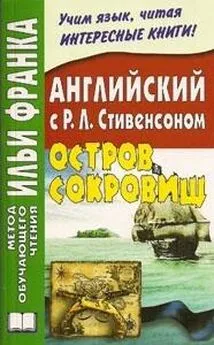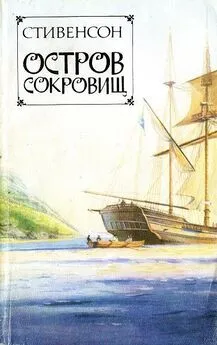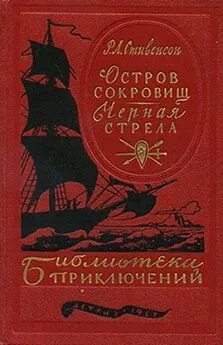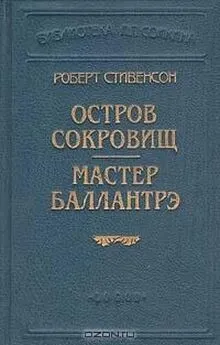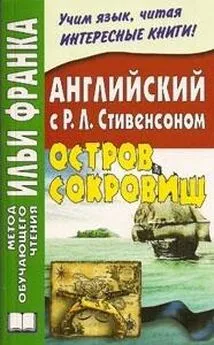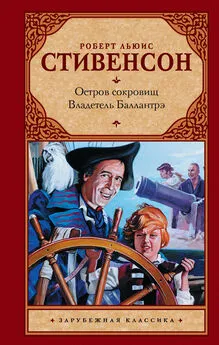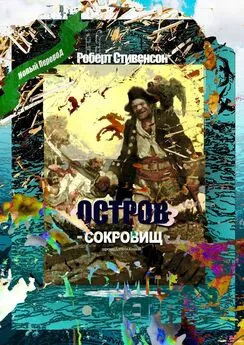Роберт Стивенсон - Английский язык с Р.Л.Стивенсоном. Остров сокровищ (ASCII-IPA)
- Название:Английский язык с Р.Л.Стивенсоном. Остров сокровищ (ASCII-IPA)
- Автор:
- Жанр:
- Издательство:неизвестно
- Год:неизвестен
- ISBN:нет данных
- Рейтинг:
- Избранное:Добавить в избранное
-
Отзывы:
-
Ваша оценка:
Роберт Стивенсон - Английский язык с Р.Л.Стивенсоном. Остров сокровищ (ASCII-IPA) краткое содержание
Тут вы не только вернетесь в мир детства, но и откроете для себя заново этого чудесного мастера слова. Это — язык великой английской литературы XIX века, без понимания которого вы никогда не будете чувствовать себя уверенно и в современном английском.
Книга адаптирована (без упрощения текста оригинала) по методу Ильи Франка. Текст разбит на небольшие отрывки, каждый из них повторяется дважды: сначала идет английский текст с «подсказками» — с вкрапленным в него дословным русским переводом и комментариями, а затем — тот же текст, но уже в чистом виде, без подсказок.
Начинающие осваивать английский язык могут читать сначала отрывок текста с подсказками, а затем тот же отрывок — без подсказок. Вы как бы учитесь плавать: сначала плывете с доской, потом без доски. Совершенствующие свой английский могут поступать наоборот: читать текст без подсказок, по мере необходимости подглядывая в подсказки.
Запоминание слов и выражений происходит при этом за счет их повторяемости, без зубрежки. Кроме того, читатель привыкает к логике английского языка, начинает его «чувствовать».
Этот метод избавляет вас от стресса первого этапа освоения языка — от механического поиска каждого слова в словаре и от бесплодного гадания, что же все-таки значит фраза, все слова из которой вы уже нашли.
Пособие способствует эффективному освоению языка, может служить дополнением к учебникам по грамматике или к основным занятиям. Предназначено для студентов, для изучающих английский язык самостоятельно, а также для всех интересующихся английской культурой.
Мультиязыковой проект Ильи Франка: www.franklang.ru
NB: Есть два способа оформления транскрипции: UTF-LATIN и ASCII-IPA. Для корректного отображения UTF-LATIN необходимы полноценные юникодные шрифты, например, DejaVu или Arial Unicode MS. Если по каким либо причинам вас это не устраивает, воспользуйтесь ASCII-IPA версией той же самой книги (отличается только кодированием транскрипции). Но это сопряженно с небольшими трудностями восприятия на начальном этапе. Более подробно об ASCII-IPA:
http://alt-usage-english.org/ipa/ascii_ipa_combined.shtml
http://en.wikipedia.org/wiki/Kirshenbaum
Английский язык с Р.Л.Стивенсоном. Остров сокровищ (ASCII-IPA) - читать онлайн бесплатно ознакомительный отрывок
Интервал:
Закладка:
“Oh, sir,” cried I, “when do we sail(когда мы отплываем) ?”
“Sail!” says he. “We sail to-morrow(отплываем завтра) !”
schooner [`skHnq] buried [`berId] cloth [klOT] complete [kqm`plJt]
And I was going to sea myself; to sea in a schooner, with a piping boatswain, and pig-tailed singing seamen; to sea, bound for an unknown island, and to seek for buried treasures!
While I was still in this delightful dream, we came suddenly in front of a large inn, and met Squire Trelawney, all dressed out like a sea-officer, in stout blue cloth, coming out of the door with a smile on his face, and a capital imitation of a sailor’s walk.
“Here you are,” he cried, “and the doctor came last night from London. Bravo! the ship’s company complete!”
“Oh, sir,” cried I, “when do we sail?”
“Sail!” says he. “We sail to-morrow!”
Chapter VIII (глава 8)
At the Sign of the Spy-Glass (под вывеской = в таверне «Подзорная Труба»)
WHEN I had done breakfasting the squire gave me a note addressed to John Silver(когда я позавтракал, сквайр дал мне записку, адресованную Джону Сильверу) , at the sign of the “Spy-glass,”(/находящемуся/ в таверне: «под вывеской» «Подзорная Труба»; sign — знак, символ; вывеска ) and told me I should easily find the place by following the line of the docks(сказал мне, что я легко найду место, идя линией доков = по набережной) , and keeping a bright look-out for a little tavern with a large brass telescope for sign(и внимательно ища маленькую таверну с большой медной подзорной трубой вместо вывески; to keep a look-out — вести наблюдение; bright — яркий; расторопный, острый ) .
I set off, overjoyed at this opportunity to see some more of the ships and seamen(я отправился, очень обрадованный этой возможностью увидеть /еще/ больше кораблей и моряков) , and picked my way among a great crowd of people and carts and bales(и выбрал дорогу через большую толпу /людей/, повозок и тюков) , for the dock was now at its busiest(так как док = порт был теперь в своем самом большом оживлении = в порту было много работы; busy — занятый; беспокойный, оживленный ) , until I found the tavern in question(пока я не нашел таверну, о которой идет речь: «в вопросе») .
It was a bright enough little place of entertainment(это было довольно уютное маленькое увеселительное заведение: «место развлечения») . The sign was newly painted(вывеска была недавно покрашена) ; the windows had neat red curtains(окна имели опрятные красные занавески) ; the floor was cleanly sanded(пол был посыпан чистым песком) . There was a street on each side(на каждой стороне была улица = таверна выходила на две улицы) , and an open door on both(и открытая дверь была на каждой /стороне/) , which made the large, low room pretty clear to see in(что делало большую низкую = с низким потолком комнату довольно светлой: «довольно ясной, чтобы видеть в ней») , in spite of clouds of tobacco smoke(несмотря на клубы табачного дыма) .
tavern [`txvqn] overjoyed [quvq`GOId] crowd [kraud] curtains [`kq:tnz] cloud [klaud]
WHEN I had done breakfasting the squire gave me a note addressed to John Silver, at the sign of the “Spy-glass,” and told me I should easily find the place by following the line of the docks, and keeping a bright look-out for a little tavern with a large brass telescope for sign.
I set off, overjoyed at this opportunity to see some more of the ships and seamen, and picked my way among a great crowd of people and carts and bales, for the dock was now at its busiest, until I found the tavern in question.
It was a bright enough little place of entertainment. The sign was newly painted; the windows had neat red curtains; the floor was cleanly sanded. There was a street on each side, and an open door on both, which made the large, low room pretty clear to see in, in spite of clouds of tobacco smoke.
The customers were mostly seafaring men(клиенты были, главным образом, моряками) ; and they talked so loudly that I hung at the door, almost afraid to enter(они разговаривали так громко, что я остановился у двери, почти боясь войти) .
As I was waiting(пока я ждал) , a man came out of a side room(человек вышел из боковой комнаты) , and, at a glance, I was sure he must be Long John(и, с первого взгляда /на него/, я был уверен, что он должен быть = это и есть Долговязый Джон) . His left leg was cut off close by the hip(его левая нога была отрезана вплотную к = по самое бедро) , and under the left shoulder he carried a crutch(под левым плечом он держал: «нес» костыль) , which he managed with wonderful dexterity(которым управлял с удивительным проворством; dexterity — проворство, ловкость ) , hopping about upon it like a bird(прыгая на нем, словно птица) . He was very tall and strong(был очень высоким и сильным) , with a face as big as a ham(с лицом, большим, словно окорок) — plain and pale, but intelligent and smiling(некрасивым и бледным, но смышленым и улыбчивым; plain — плоский; некрасивый ) . Indeed, he seemed in the most cheerful spirits(в самом деле, он, казалось, /находился/ в самом веселом расположении духа) , whistling as he moved about among the tables(посвистывал, ходя посреди столов) , with a merry word or a slap on the shoulder for the more favoured of his guests(с веселым словом = шуткой или хлопком по плечу для самых любимых своих /из/ посетителей) .
customers [`kAstqmqz] dexterity [deks`terItI] whistling [`wIslIN] favoured [`feIvqd]
The customers were mostly seafaring men; and they talked so loudly that I hung at the door, almost afraid to enter.
As I was waiting, a man came out of a side room, and, at a glance, I was sure he must be Long John. His left leg was cut off close by the hip, and under the left shoulder he carried a crutch, which he managed with wonderful dexterity, hopping about upon it like a bird. He was very tall and strong, with a face as big as a ham — plain and pale, but intelligent and smiling. Indeed, he seemed in the most cheerful spirits, whistling as he moved about among the tables, with a merry word or a slap on the shoulder for the more favoured of his guests.
Now, to tell you the truth(теперь, по правде говоря) , from the very first mention of Long John in Squire Trelawney’s letter(с самого первого упоминания о Долговязом Джоне в письме сквайра) , I had taken a fear in my mind(я взял страх в свой разум = с ужасом подумал) that he might prove to be the very one-legged sailor(что он может оказаться тем самым одноногим моряком) whom I had watched for so long at the old “Benbow”(которого я выжидал так долго в старом «Бенбоу») . But one look at the man before me was enough(но одного взгляда на человека, /стоявшего/ передо мной, было достаточно) . I had seen the captain, and Black Dog, and the blind man Pew(я видел капитана, Черного Пса, слепого Пью) , and I thought I knew what a buccaneer was like(и думал, что знаю, на что пират похож) — a very different creature, according to me(очень отличное существо, по моему мнению) , from this clean and pleasant-tempered landlord(от этого опрятного и добродушного хозяина; pleasant — приятный, милый ) .
I plucked up courage at once(я собрался с духом сразу; to pluck — собирать, срывать; courage — храбрость, мужество ) , crossed the threshold(переступил порог; to cross — пересекать, переходить ) , and walked right up to the man where he stood(и пошел прямо к нему, где он стоял) , propped on his crutch, talking to a customer(опершись на костыль, разговаривая с посетителем) .
“Mr. Silver, sir(мистер Сильвер, сэр) ?” I asked, holding out the note(я спросил, протягивая записку) .
creature [`krJtSq] pleasant [`pleznt] courage [`kArIG]
Now, to tell you the truth, from the very first mention of Long John in Squire Trelawney’s letter, I had taken a fear in my mind that he might prove to be the very one-legged sailor whom I had watched for so long at the old “Benbow.” But one look at the man before me was enough. I had seen the captain, and Black Dog, and the blind man Pew, and I thought I knew what a buccaneer was like — a very different creature, according to me, from this clean and pleasant-tempered landlord.
I plucked up courage at once, crossed the threshold, and walked right up to the man where he stood, propped on his crutch, talking to a customer.
“Mr. Silver, sir?” I asked, holding out the note.
“Yes, my lad(да, мой мальчик) ,” said he; “such is my name, to be sure(таково мое имя, конечно) . And who may you be(а кто ты такой: «кем ты можешь быть») ?” And then as he saw the squire’s letter, he seemed to me to give something almost like a start(увидев письмо сквайра, мне показалось, он вроде бы вздрогнул) .
Читать дальшеИнтервал:
Закладка:
